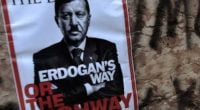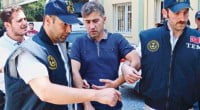Is man living in Pennsylvania responsible for Turkey coup attempt?

Date posted: July 15, 2016
ANKARA, Turkey — Low-flying military jets buzzed over Turkey’s capital of Ankara. Soldiers blocked major bridges in Istanbul. State-run television announced that the military had imposed martial law.
In an interview via FaceTime on CNN Turk television, Turkish President Recep Tayyip Erdogan blamed the coup on an international opposition network.
That movement, known as Hizmet, is led by Fethullah Gulen, a Turkish imam and Islamic scholar who has been living in Pennsylvania in the Saylorsburg area.
The Alliance for Shared Values, a nonprofit affiliated with Gulen, issued the following statement in response.
“For more than 40 years, Fethullah Gulen and Hizmet participants have advocated for, and demonstrated their commitment to, peace and democracy. We have consistently denounced military interventions in domestic politics. These are core values of Hizmet participants. We condemn any military intervention in domestic politics of Turkey.
Events on the ground are moving quickly and it would be irresponsible for us to speculate on them. We remain concerned about the safety and security of Turkish citizens and those in Turkey right now.
Comments by pro-Erdogan circles about the movement are highly irresponsible.”
Erdogan urged people to take to the streets against the military. He vowed to return Ankara. His location was unclear.
“This was done from outside the chain of command,” he said, adding that lower-ranking officers had rebelled against senior officers.
“In history, nowhere in the world has a coup been successful,” Erdogan added. “Sooner or later, they all fail.”
Meanwhile, thousands across Istanbul and Ankara began flooding the streets alongside military tanks.
Famously sensitive to criticism, Erdogan is no stranger to controversy. Here’s how he rose to power and divided a country.
The bitter divide over a leader
“So long as you love the people sincerely and deeply, people will love you,” Erdogan told CNN in March.
But the population is bitterly divided between citizens who love — or loathe — their president.
Along with deadly jihadist bombings and rising tensions with the country’s largest ethnic minority, Turkey is perhaps more internally politically polarized than ever.
Since the beginning of the Syrian uprising, Erdogan has used the conflict as an opportunity to crack down on the Kurdish Workers Party (PKK). The militant group has been battling the Turkish state for decades and is listed as a terrorist organization by NATO, the U.S. and the EU.
The strategy “stoked the fires of Kurdish grievances, and the PKK returned the favor in-kind — ratcheting up its terror attacks on the Turkish state, mainly against security institutions like the police, which have increased in number and frequency over the past five years,” according to Lina Khatib, head of the Middle East and North Africa Programme at Chatham House.
But Erdogan also benefited. He used the attacks to portray himself as the man protecting the nation from terrorism.
However, Erdogan’s image has been tarnished by strict internet censorship — Twitter, Facebook and YouTube are frequently blocked in Turkey — and the wholesale sacking of police officers and prosecutors who had investigated his government for corruption.
‘I’m not at war with the press’
In March, Erodgan’s critics accused him of launching a nationwide crackdown on dissent in the media — and society at large.
Turkish authorities seized control of the country’s largest newspaper earlier this year. Turkish journalists were tried for espionage after publishing a video allegedly showing the intelligence agency funneling weapons into Syria.
“I’m not at war with the press,” Erdogan insisted.
Insulting the president is a crime in Turkey. More than 1,800 cases have been filed since Erdogan took office in 2014, according to the country’s Justice Minister.
Turkey’s troubled relationship with the media has long been a point of contention for the European Union, which has said freedom of the press and of expression are nonnegotiable conditions for joining the EU. Erdogan has called these concerns “irrelevant obstacles.”
From prime minister to president
Erogan is the co-founder of Turkey’s ruling Justice and Development Party (AKP). He was elected prime minister in 2003. Under his rule, Turkey became a powerhouse in the Middle East. His reign came to an end in 2014, and his own party’s rules prevented him from seeking a fourth term. So, he ran for president — and won.
Before this, the president of Turkey was a largely ceremonial role, but Erdogan tried to change that by altering the constitution to give him more power.
The 2015 election resulted in a hung Parliament, leading to sweeping anti-government protests and terror attacks. Turkey held a snap election, and with that, Erdogan’s AK Party regained control.
Under Erdogan, who is extremely conservative, religion has started to play a more important role in Turkey, which is a largely secular country. He was active in Islamist circles in the 1970s and 1980s.
A champion of pious, working class Turks, Erdogan had until recently presided over a prolonged period of economic expansion.
But the heady days when Erdogan pushed reformist agenda and lobbied to win Turkey’s membership in the European Union have long faded.
Source: TRIBUNE MEDIA WIRE , July 15, 2016
Tags: Defamation of Hizmet | Fethullah Gulen | Hizmet and politics | Military coups in Turkey | Turkey trips |
























